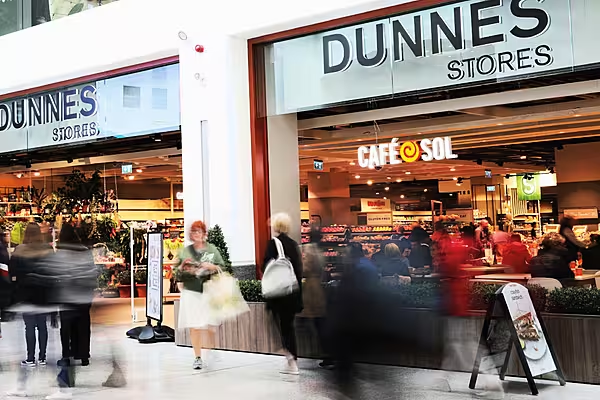Dunnes continues to hold the highest market share among all retailers, at 23.7%, with year-on-year growth of 9.6% in the 12 weeks to 25 December, research shows.
The latest grocery market share figures from Kantar in Ireland showed that Dunnes had the strongest growth in premium own-label offerings, up by 22%, year on year.
Tesco holds 23% of the market, with year-on-year growth of 8.9%.
Tesco also has the strongest frequency growth among all retailers, of 10.6%, year on year.
SuperValu has 21% of the market and growth of 1.2%, registering the highest number of trips to stores, at 21.
Lidl holds a 12.2% share, with the strongest year-on-year growth among all retailers, of 10.1%, driven by an influx of new shoppers and more trips, contributing an additional €32.4 million to its overall performance.
Lidl also saw the strongest growth of value own-label sales, up by 47.2%, year on year.
Aldi has 11.6% of the market, growing by 7.1%, year on year, as new shoppers and more trips contributed an additional €25.9 million to its overall performance.
Take-Home Grocery Sales
Take-home grocery sales in Ireland increased by 10% in the four weeks to 25 December 2022, as the average price per pack soared by 13% and visits to stores increased by 7%, the research shows.
The first Christmas since 2019 with no Covid-19 restrictions saw shoppers spend an additional €119 million, making it a record-breaking month, with sales of €1.3 billon, and the strongest growth since February 2021.
Grocery inflation now stands at 15.4% for the 12-week period ending 25 December 2022 – the highest level yet, and even higher than in UK, which currently stands at 14.2%.
A significant increase in average price per pack saw shoppers spend an additional €95.31, compared to the same time last year, but while value sales went up by 6.7%, grocery price inflation is the real driving factor behind this, rather than increased purchasing, as volumes fell by 4%.
Emer Healy, senior retail analyst at Kantar, commented, “Christmas was certainly different this year. Even though 46.5% of buyers claimed they would spend less than previous years, the cost-of-living crisis didn’t stop Irish families from looking for ways to keep spirits high, with the average shopper spending €58 more on groceries during December than they did last year.”
Festive Treats
According to the data, nearly half of the population stocked up on festive treats on Friday 23 December – the busiest shopping day of the year – with €94.4 million going through the tills. This was €8.6 million more than the busiest trading day last year (Thursday 23 December).
Sales of festive treats or niceties, such as chocolate, cheese and pâté, rose by 9.9%, and mince pies by 15.5%, but all declined in volume.
Wine bucked the trend, with shoppers spending an additional €13.3 million, year on year, with strong volume growth of 7.3%.
Smaller Christmas gatherings in 2020 and 2021 led to more households opting for rolled turkey, but this year, 25,000 more households tucked into whole turkeys, reflecting the 32% of buyers who planned on having five to seven people for Christmas dinner.
During December, sales of cold and flu products, as well as household cleaners, also grew, as Irish shoppers spent an additional €828,000 on cold treatments and €547,000 on vitamins.
A restriction-free Christmas also meant that more people were hosting others and cleaning their homes, resulting in shoppers spending an additional €6.8 million on household and cleaning products.
Festive Premium Ranges
With Irish consumers keeping a close eye on their spending, but also wanting to enjoy the festive period, they continued to trade down to supermarkets’ own-label products, with sales rising by 11.1% – well ahead of the 4.2% increase in branded lines.
Kantar’s Healy explained, “The Irish grocery market is more competitive than ever before, and over the Christmas period, the supermarkets were keen to retain and attract shoppers with offers on their premium private-label lines of festive alternatives, reaching record sales of €149.7 million.”
In December, online sales remained strong – up by 8.5%, year on year – with shoppers spending an additional €4.7 million.
Online share now sits at 4.6% – up by 2.5%, compared to December 2018 – but the impact of inflation is evident, as the average cost of a virtual basket is now €88.79 – up by €11.70, compared to 2018.
© 2023 Checkout – your source for the latest Irish retail news. Article by Donna Ahern. For more retail news, click here. Click subscribe to sign up for the Checkout print edition.





